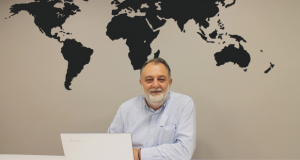 ‘Turkey is a large and promising emerging market and cannot be ignored based on short-term volatility,’ say foreign professional investors
‘Turkey is a large and promising emerging market and cannot be ignored based on short-term volatility,’ say foreign professional investors
ANKARA – Foreign investors are bullish on Turkey and are looking to place more funds in the country, investors have told Anadolu Agency. The prospect of rising interest rates in the U.S. – with Federal Reserve Chairwoman Janet Yellen indicating that a rate hike could be expected within a few months – is beginning to drive investors away from some emerging markets, experts told Anadolu Agency. Since the beginning of March, emerging-market stocks have sold off by roughly 4 percent, according data from Spiro Sovereign Strategy in London. But professional foreign investors are not dismayed. “ Turkey is a large and promising emerging market and cannot be ignored based on short term volatility. I certainly believe that, with good economy management, it will be an attractive investment space for investors at large,” commented Didem Gordon, chief executive of emerging market fund manager Ashmore, Turkey, told AA. Gordon pointed out that certain sectors in Turkey remain very attractive. She said: “Valuations as well as growth prospects determine the attractiveness for companies as well as sectors. Among those, consumer demand-driven businesses in a variety of sectors are always appealing given Turkey’s demographics.“Technology and energy are also among sectors as well as companies with solid export businesses. Turkish banking sector valuations are also becoming more attractive among emerging markets.” As Gordon’s view shows, professional foreign investors are less troubled by periodic “noise” on markets, and more likely to base their investment choices on fundamentals. This is important for Turkey, because New York investors hold about one-fifth of all stocks on the BIST-100 Index, the main index on the Istanbul stock market.
‘Sound climate’
But a recent study by economists at Alliant International University in California showed that professional U.S. investors are much more likely to look at business fundamentals than at bits of good and bad news when making investment decisions. Ashmore’s Gordon agrees: “We are a fundamental-analysis driven asset manager with a long-term investment horizon. Upcoming elections are just one of the factors we consider in making our investment decisions.” So the concerns about politics in Turkey, for example, with an important election coming up in June, are not likely to weigh much in the estimation of such investors. “That politicians mingle in the economy happens everywhere. The financial data in Turkey remains sound. The investment climate remains sound,” said Pim van Ballekom, vice-president responsible for finance at the European Investment Bank, at a press conference in January.
‘Best performers’
Turkey is the most important market for the European Investment Bank (EIB) outside of the EU, accounting for 25 percent of its non-EU lending, said van Ballekom, adding: “There have been times in Turkey when there were turbulences, not only in Turkey but economically in the world, where the economy reacted forcefully. “Although there were problems, I admire the Turkish government in dealing with those problems,” explained Ballekom. Indeed, many professional foreign investors just shrug off the news and keep their eyes on the numbers. Analysts at asset manager Manning & Napier based in Rochester, New York, said in a note published on Feb. 3: “Turkey and China were the best performing markets on both a USD and local currency basis (in 2014). “Notably, Turkey posted strong double-digit returns and was the best performing equity market across the globe in both USD and local currency terms during the fourth quarter of 2014.”
‘Greater prospects’
They explained: “The long-term prospects are extraordinary. Turkey, like some other emerging markets, has prospects even more compelling when compared to the slow growth of the developed world. “The consumer markets in many of these countries are large, with rapidly expanding middle class populations that are seeing greater economic prospects than ever before.” “The number of people in the emerging world receiving their tertiary education is set to increase substantially in the next few decades, and the sheer size of the population leaves room for immense consumption opportunities. The need for more investment in high quality infrastructure, technology and medical services is immense and there is much pentup demand.” To be sure, professional foreign investors have issues about certain aspects of the Turkish economy. “Turkey’s softest spot has been its large current account deficit which, given the recent fall in oil prices, should recover positively,” Gordon said.
‘Economic freedom’
Chris DeMuth Jr, a portfolio manager at Rangeley Capital at the New Canaan in Connecticut, points to Turkish lira volatility as a concern for foreign investors. “But with a little time and stability, things could improve by the end of the year,” DeMuth Jr. said in a note published on March 10. “Turkey has been improving in a number of other areas, including improvements in bank capital ratios, public debt levels, current account balance and tourism. Tourism is more affordable with the currency decline. Its market cap-to-GDP is currently around 39 percent,” he said. Market capitalization to GDP is a long-term valuation indicator; values above 100 percent show that companies are overvalued, while those below 50 percent are undervalued, so the Turkish statistic shows relative undervaluation. “And, in terms of economic freedom, it is slightly better than the world average,” DeMuth said.
 SleepTech Magazine Mattress, Accessories, Machinery, Raw Materials
SleepTech Magazine Mattress, Accessories, Machinery, Raw Materials


